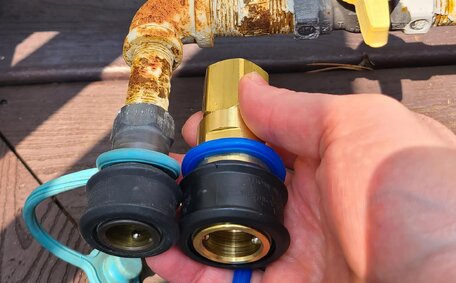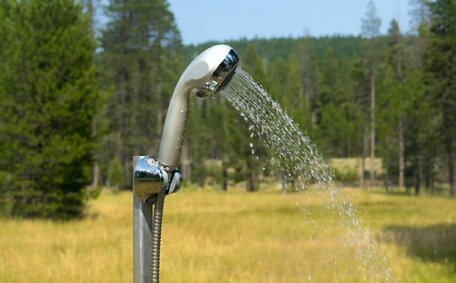Why You Might Need to Move Your Gas Meter
Several reasons may necessitate the relocation of your gas meter, such as:
- Home renovations or expansions that require relocating the meter when it exceeds a one-metre distance
- Upgrading to a natural gas meter to enhance your energy services could require repositioning your meter
- Safety issues with the current metre site, like restricted access for emergency shut off
- Changes to building codes or regulations for metre locations
- Sale of the property requiring updated gas connections
A professional gas engineer should assess and determine the need for relocation whenever the gas meter becomes obstructed, inaccessible, or poses a safety risk. Correct positioning when relocating a meter ensures emergency accessibility, adequate ventilation, and safe clearance from potential ignition sources. It also avoids damage from vehicles, weather, vegetation growth or unauthorised interference.
Attempting to move your gas meter without professional approval is illegal and dangerous. Faulty DIY metre moves can cause fires, explosions and gas leaks. Always consult licenced professionals who know how to go about the safe relocation of meters, ensuring all regulations are met.
The Role of Gas Engineers and Transporters
Certified gas fitters ascertain the safest approach for relocating your gas meter. As Gas Safe registered experts, their work strictly aligns with safety standards and gas fitting regulations.
Gas engineers will meticulously check the pipes for safety and compliance when managing your meter:
- Carry out on-site assessments at your meter’s location
- Choose a new meter position that satisfies accessibility, ventilation, and safety stipulations
- Disconnect and cap old metre sites
- Establish new routes and pipes for your smart meter, which sometimes mirror those needed for your electricity gas meter, if necessary
- Install and commission the new meter to ensure it integrates smoothly with your home energy system
- Inspect all work done upon completion
- Certify the new gas installation’s compliance and safety
Gas transporters and network operators assist in managing supply interruptions during the relocation process at your home.
It is against the law and highly dangerous to attempt meter relocation on your own, without professional qualifications. Always enlist Gas Safe registered professionals to safely oversee your gas meter relocation.
Safety Considerations When Moving Gas Infrastructure
Moving gas infrastructure necessitates significant safety considerations that only qualified professionals are equipped to handle.
Gas engineers mitigate specific risks associated with relocating your gas meter, including:
- If you smell gas, it could indicate gas leaks due to improper line disconnections or connections.
- Explosions - Faulty fittings and pipework create explosion hazards.
- Carbon monoxide poisoning - Incorrect ventilation during metre moves causes CO buildup.
- Fires - Leaks, explosions and ignition sources combine to enable gas fires.
- Structural damage - Gas blasts can destroy property.
By managing supply suspensions, performing leak tests, and ensuring correct pressure, engineers work with your plumber to relocate the gas meter safely.
Licenced professionals also guarantee compliance with AS/NZS 5601, Australia’s Gas Installations Standard, throughout the process of moving the gas meter. This covers proper safety procedures, materials, fittings, locations and clearances for gas infrastructure.
Regulations and Compliance for Gas Meter Relocation
The relocation of your gas and electric meters must comply with AS/NZS 5601 regulations, which mandate that only certified professionals conduct gas fitting operations.
When you want move your gas meter, gas engineers must:
- Begin by contacting your local council for necessary approvals
- Inform gas transporters to safely disconnect the supply during meter relocation
- Confirm the new site meets location, accessibility, and ventilation codes
- Employ certified materials and fittings for the new gas piping
- Test for leaks and verify system integrity after reconnection
- Certify the new installation’s compliance
Specific requirements, like minimum distance from openings or ignition sources, may vary by state or territory. In NSW, the Gas Supply Act 1996 and Gas Supply (Safety and Network Management) Regulation 2013 govern gas infrastructure.
Failure to comply with regulations risks fines, supply disconnection and serious safety incidents. A licenced Gladesville gas engineer can get your meter moved and will navigate all legislative requirements for safe, legal meter relocations.
Preparing Your Property Before Moving the Meter
It’s critical to ensure the correct meter is installed and accessible in the new box to maintain appliance safety before relocating your gas meter. This ensures that gas engineers can safely access gas appliances, meters, and piping for all related relocation activities.
Suggested preparation steps include:
- Clear a one-metre radius around the current gas meter box by removing any vegetation or structures to ensure access.
- Confirm that gas engineers can access the service pipe from the street to your front door
- Check for any obstructed pathways impeding equipment access through gates or narrow spaces
- Secure pets to avoid interference with site works
- Notify all home occupants, questioning 'are there any safety concerns?' and particularly instruct children to avoid work areas for safety
- Coordinate timing schedules with gas engineers to have the meters moved efficiently
- Be prepared to provide your gas account information promptly to expedite administrative procedures
Arranging a timely appraisal of your gas appliances will minimise delays and ensure a safe, efficient meter relocation.
Notifying Suppliers and Authorities About Meter Movement
It’s crucial you find your way to notifying your supplier promptly when you have plans to relocate your gas service. This allows them to consider your plans when updating your energy account details, arranging for supply isolation during the works to move meter, and certifying the new installation.
To arrange meter relocation in Gladesville, contact your energy supplier by following these steps:
- Contact your gas distributor via phone or email at least 10 business days before the proposed relocation date
- Provide details like your account number, address, and the reason to move gas metre
- Confirm whether any special council permits or approvals are needed for the new metre location
- Discuss timeframes for gas electric meter supply isolation and reconnection to minimise outage
- Update your account admin details to reflect the new metre serial number after installation
While gas engineers coordinate with authorities for the relocation, informing your gas retailer early facilitates access and scheduling arrangements. For assistance, contact your gas service provider.
The Step-By-Step Process of Moving a Gas Meter
Relocating a gas meter is a complex process that necessitates coordination with gas engineers and authorities. The standard step-by-step procedure involves:
- Choose a service from a licensed gas engineer for an initial assessment and site inspection to identify the best new meter position.
- Apply for any required council permits or approvals for the new site, a task that your gas engineer can assist with.
- Notify your gas supplier at least 10 business days before disconnection to arrange supply isolation.
- Prepare the property by clearing access paths and securing pets.
- On the scheduled date, the gas engineer will disconnect and cap old metre sites and pipes.
- New gas infrastructure like pipes and mountings will be installed at the new metre site.
- The new gas metre will be fitted, pressure tested and connected to gas supply lines.
- System integrity is verified through leak checks before reconnecting gas supply.
- The gas engineer certifies and documents the new gas installation’s compliance.
- Finally, administrative tasks like account number changes are completed to reflect the new metre.
The complete procedure encapsulates the total cost of moving a gas meter, which may range from 5 days to 3 weeks based on coordination and appliance configuration.
Costs and Budgeting for Gas Meter Relocation
The cost move gas process incorporates expenses such as materials, equipment, labour, and administrative fees. In Gladesville, the range for how much moving a meter can cost varies from $800 to $2,500, depending on factors such as:
- The distance of the relocation - Greater distances increase pipework and labour costs.
- Complexity of the new location - Difficulties in access or challenging terrain can elevate costs.
- The need for specialised equipment - Working in confined spaces may incur additional rental fees.
- Administration and permits - Council applications and transport operator fees.
Standard costs involve:
- From approximately AUD 150 per hour for licensed gas engineer labour.
- From AUD 20 to AUD 60 per metre for new gas piping, depending on specifications.
- Minimum of AUD 100 for council applications, where required.
- Fees exceeding AUD 250 for the disconnection and reconnection by the gas network operator.
In conclusion, we leave you with the recommendation to obtain fixed quotes from reputable sources, accounting for meter box location and other elements, which you can trust to competently handle the task. By requesting a detailed quote, you can determine if it includes all pipework, labour, materials, and fees without hidden charges. They can also advise on any council approvals required for your particular situation.
Professional coordination simplifies even complex meter relocations, making the process smooth and cost-efficient. Feel free to reach out to us for skilled assistance. You can call us today to engage our Gladesville gas engineers to discuss your relocation endeavours and receive obligation-free quotes.






